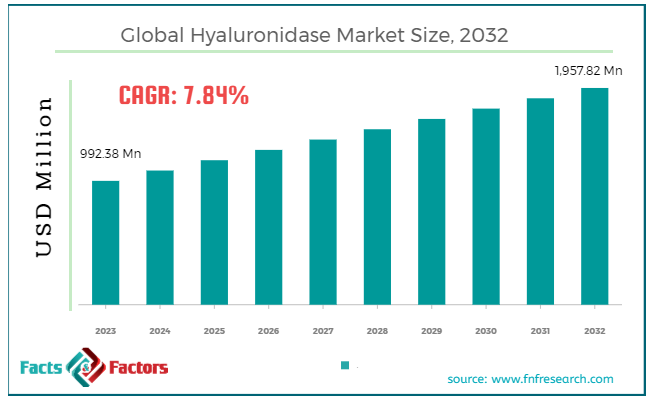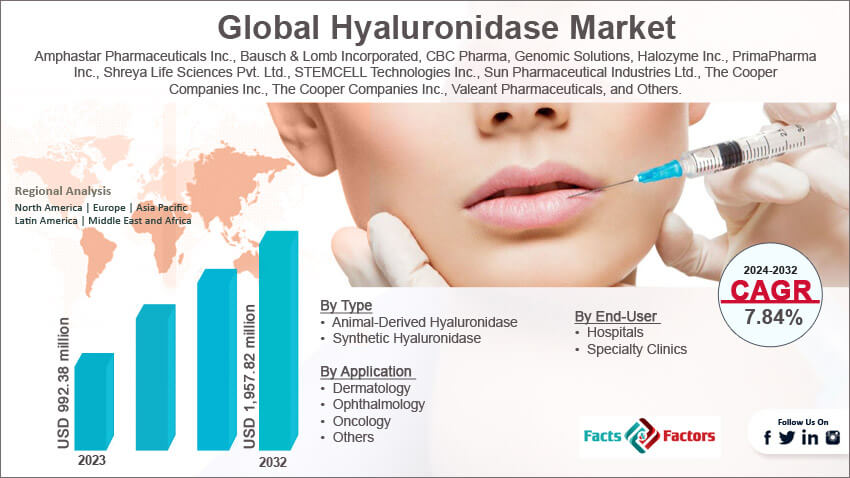Search Market Research Report
Hyaluronidase Market Size, Share Global Analysis Report, 2024 – 2032

Hyaluronidase Market Size, Share, Growth Analysis Report By By Type (Animal-Derived Hyaluronidase and Synthetic Hyaluronidase), By Application (Dermatology, Ophthalmology, Oncology, and Others), By End-User (Hospitals and Specialty Clinics), And By Region - Global and Regional Industry Insights, Overview, Comprehensive Analysis, Trends, Statistical Research, Market Intelligence, Historical Data and Forecast 2024 – 2032
Industry Insights
[219+ Pages Report] According to Facts & Factors, the global hyaluronidase market size in terms of revenue was valued at around USD 992.38 million in 2023 and is expected to reach a value of USD 1,957.82 million by 2032, growing at a CAGR of roughly 7.84% from 2024 to 2032. The global hyaluronidase market is projected to grow at a significant growth rate due to several driving factors.

 Market Overview
Market Overview
Hyaluronidase is an enzyme naturally present in the body that breaks down hyaluronic acid. It helps in tissue permeability by breaking down hyaluronic acid, making it easier for fluids and other substances to spread through the tissues. This property makes hyaluronidase useful in medical applications, such as enhancing the effectiveness of other drugs by promoting their dispersion and absorption. It is commonly used in conjunction with local anesthetics, in the promotion of resorption of fluids in cases of edema, and can also assist in the management of some hypertrophic disorders. Hyaluronidase has a more interesting use in the medical and cosmetic world.
 Key Highlights
Key Highlights
- The hyaluronidase market has registered a CAGR of 7.84% during the forecast period.
- In terms of revenue, the global hyaluronidase market was estimated at roughly USD 992.38 million in 2023 and is predicted to attain a value of USD 1,957.82 million by 2032.
- The hyaluronidase market is driven by the growing demand for effective and minimally invasive medical, ongoing research, and the expanding global demand for effective medical and cosmetic treatments.
- On the basis of Type, the animal-derived hyaluronidase segment is growing at a high rate and is projected to dominate the global market.
- Based on Application, the dermatology segment is expected to dominate the global market.
- By region, North America is expected to dominate the global market during the forecast period.

 Growth Drivers:
Growth Drivers:
- Booming Cosmetic Procedures: The increasing popularity of dermal fillers containing hyaluronic acid creates a demand for hyaluronidase as a corrective measure. In case of unwanted results or complications, hyaluronidase can dissolve the filler, offering a safety net for patients and driving market growth.
- Minimally Invasive Focus: Hyaluronidase aids in the absorption and dispersion of drugs, making it valuable for minimally invasive procedures. As healthcare shifts towards less-invasive approaches, the demand for hyaluronidase rises alongside.
- Skin Condition Solutions: Hyaluronidase shows promise in treating various skin conditions like acne and rosacea. This broadens its application scope and creates opportunities in the dermatology segment of the market.
 Restraints:
Restraints:
- COVID-19 Impact: The pandemic caused a temporary setback, with the decline in elective cosmetic procedures impacting the hyaluronidase market. While the market is recovering, regaining pre-pandemic momentum might take time.
- Potential Side Effects: Like any medical intervention, hyaluronidase use carries potential side effects. Concerns about allergic reactions or unintended tissue damage can deter some patients and healthcare providers, limiting market growth.
 Opportunities:
Opportunities:
- Development of Synthetic Hyaluronidase: Currently, animal-derived hyaluronidase dominates the market. However, the development of safe and effective synthetic alternatives could expand the market by addressing concerns about animal-derived products and potentially offering lower production costs.
- Emerging Applications: Research into new applications for hyaluronidase, such as improved drug delivery or enhanced surgical outcomes, can open up new market segments and drive significant growth.
 Challenges:
Challenges:
- Stringent Regulations: Regulatory bodies have strict requirements for the approval and use of hyaluronidase. This can create hurdles for new entrants and slow down market innovation.
- Reimbursement Issues: Depending on the application, insurance coverage for hyaluronidase treatments might be limited. This can be a barrier for patients seeking hyaluronidase-based procedures, impacting market growth.
 Hyaluronidase Market: Segmentation Analysis
Hyaluronidase Market: Segmentation Analysis
The global hyaluronidase market is segmented based on type, application, end-user and region.
 By Type Insights
By Type Insights
Based on Type, the global hyaluronidase market is bifurcated into animal-derived hyaluronidase and synthetic hyaluronidase. Animal-derived hyaluronidase segment currently holds the dominant market share due to the established track record and perceived effectiveness of animal-derived (often bovine or ovine) hyaluronidase. This segment accounted for 68.5% of the total revenue share in 2023.
However, ethical concerns and potential allergic reactions might limit future growth. Synthetic hyaluronidase segment is gaining traction as companies develop safe and effective alternatives. Synthetic options could address ethical concerns and potentially offer lower production costs, leading to a projected increase in CAGR.
 By Application Insights
By Application Insights
On the basis of Application, the global hyaluronidase market is categorized into dermatology, ophthalmology, oncology, and others. Dermatology is the leading application segment, driven by the use of hyaluronidase for dissolving dermal fillers and treating various skin conditions. This segment accounted 46.7% revenue share in 2023. The increasing popularity of cosmetic procedures and rising skin concerns contribute to this segment's dominance. Hyaluronidase is used in some ophthalmic surgeries to facilitate tissue manipulation.
Growth in this segment is expected to be steady, driven by the advancement of minimally invasive ophthalmic procedures. Oncology is the emerging applications of hyaluronidase in cancer treatment, such as improving drug delivery, hold promise for this segment's future growth. However, it's still in the early stages of development.
 By End-User Insights
By End-User Insights
Based on End-User, the global hyaluronidase market is categorized into Hospitals and Specialty Clinics. Hospitals are the largest end-users of hyaluronidase, utilizing this enzyme in various therapeutic and surgical applications. The segment benefits from well-established healthcare infrastructure and a high volume of patient care. Specialty clinics, especially dermatology and cosmetic surgery centers, are fast-growing end-users. As these clinics adopt innovative treatments and technologies, their demand for hyaluronidase has increased, reflecting a robust CAGR.
 Recent Developments:
Recent Developments:
- Promising Treatment for Multiple Myeloma: In December 2022, Johnson & Johnson's Janssen division reported positive results from a Phase 1b trial (MajesTEC-2) testing a combination therapy for relapsed or refractory multiple myeloma. This regimen included TECVAYLI (an antibody drug), DARZALEX FASPRO (which combines daratumumab with hyaluronidase), and lenalidomide.
- Breakthrough for Chronic Inflammatory Disease: Takeda announced successful findings from a Phase 3 trial in July 2022. Their drug HYQVIA, which uses hyaluronidase to enhance delivery, showed promise as a maintenance treatment for chronic inflammatory demyelinating polyradiculoneuropathy.
 Report Scope
Report Scope
Report Attribute |
Details |
Market Size in 2023 |
USD 992.38 Million |
Projected Market Size in 2032 |
USD 1,957.82 Million |
CAGR Growth Rate |
7.84% CAGR |
Base Year |
2023 |
Forecast Years |
2024-2032 |
Key Market Players |
Amphastar Pharmaceuticals Inc., Bausch & Lomb Incorporated, CBC Pharma, Genomic Solutions, Halozyme Inc., PrimaPharma Inc., Shreya Life Sciences Pvt. Ltd., STEMCELL Technologies Inc., Sun Pharmaceutical Industries Ltd., The Cooper Companies Inc., The Cooper Companies Inc., Valeant Pharmaceuticals, and Others. |
Key Segment |
By Type, By Application, By End-User, and By Region |
Major Regions Covered |
North America, Europe, Asia Pacific, Latin America, and the Middle East &, Africa |
Purchase Options |
Request customized purchase options to meet your research needs. Explore purchase options |
 Hyaluronidase Market: Regional Analysis
Hyaluronidase Market: Regional Analysis
- North America: With a mature healthcare infrastructure and high awareness about cosmetic procedures, North America emerges as a dominant region in the hyaluronidase market in 2023 has captured a market share of around 39.6%. The region experiences a steady Compound Annual Growth Rate (CAGR) owing to the increasing adoption of hyaluronidase in various medical and cosmetic applications.
- Europe: Similar to North America, Europe holds a significant share in the hyaluronidase market. The region benefits from advanced healthcare systems and a growing demand for minimally invasive cosmetic procedures. Europe exhibits a notable CAGR due to the rising prevalence of aesthetic concerns and an aging population.
- Asia Pacific: The Asia Pacific region demonstrates substantial potential for growth in the hyaluronidase market. This region is expected to grow at a CAGR of 11.2% during the forecast period. Factors such as improving healthcare infrastructure, increasing disposable income, and a rising emphasis on beauty and aesthetics contribute to the market's expansion. Countries like China, Japan, and South Korea are particularly prominent in driving the growth with a notable CAGR.
- Latin America: Although currently a smaller market compared to other regions, Latin America shows promising growth opportunities for hyaluronidase. The region's growing middle-class population, coupled with a rising focus on cosmetic enhancements, fuels the market's expansion. Brazil, Mexico, and Argentina are key markets exhibiting a notable CAGR.
- Middle East and Africa (MEA): The hyaluronidase market in the MEA region is growing steadily, propelled by increasing healthcare expenditure and a growing awareness of cosmetic procedures. While the market in this region is comparatively smaller, countries like UAE, Saudi Arabia, and South Africa show potential for significant growth with a moderate CAGR.
 Hyaluronidase Market: Competitive Landscape
Hyaluronidase Market: Competitive Landscape
Some of the main competitors dominating the global hyaluronidase market include;
- Amphastar Pharmaceuticals, Inc.
- Bausch & Lomb Incorporated
- CBC Pharma
- Genomic Solutions
- Halozyme, Inc.
- PrimaPharma, Inc.
- Shreya Life Sciences Pvt. Ltd.
- STEMCELL Technologies Inc.
- Sun Pharmaceutical Industries Ltd.
- The Cooper Companies Inc.
- The Cooper Companies, Inc.
- Valeant Pharmaceuticals
The global hyaluronidase market is segmented as follows:
 By Type Segment Analysis
By Type Segment Analysis
- Animal-Derived Hyaluronidase
- Synthetic Hyaluronidase
 By Application Segment Analysis
By Application Segment Analysis
- Dermatology
- Ophthalmology
- Oncology
- Others
 By End-User Segment Analysis
By End-User Segment Analysis
- Hospitals
- Specialty Clinics
 By Regional Segment Analysis
By Regional Segment Analysis
- North America
- The U.S.
- Canada
- Mexico
- Europe
- France
- The UK
- Spain
- Germany
- Italy
- Rest of Europe
- Asia Pacific
- China
- Japan
- India
- Australia
- Southeast Asia
- Rest of Asia Pacific
- The Middle East & Africa
- Saudi Arabia
- UAE
- Egypt
- Kuwait
- South Africa
- Rest of the Middle East & Africa
- Latin America
- Brazil
- Argentina
- Rest of Latin America
Industry Major Market Players
- Amphastar Pharmaceuticals, Inc.
- Bausch & Lomb Incorporated
- CBC Pharma
- Genomic Solutions
- Halozyme, Inc.
- PrimaPharma, Inc.
- Shreya Life Sciences Pvt. Ltd.
- STEMCELL Technologies Inc.
- Sun Pharmaceutical Industries Ltd.
- The Cooper Companies Inc.
- The Cooper Companies, Inc.
- Valeant Pharmaceuticals
Frequently Asked Questions

Copyright © 2025 - 2026, All Rights Reserved, Facts and Factors


